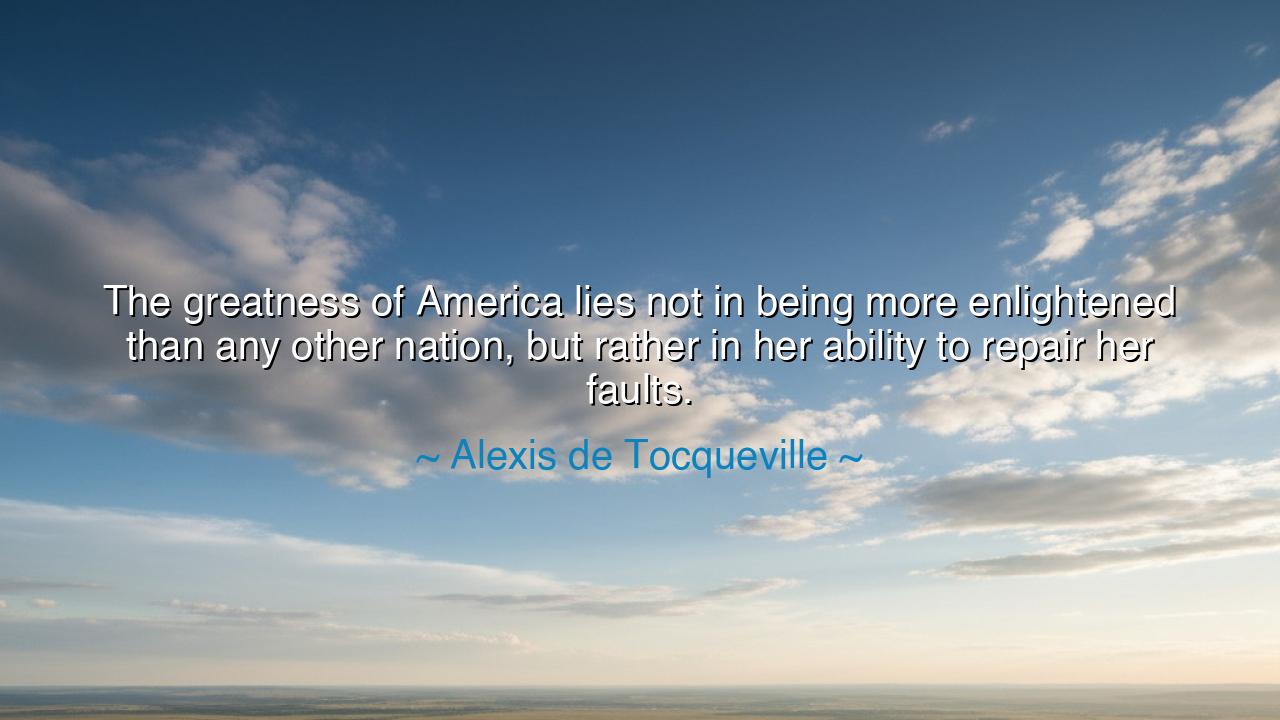
The greatness of America lies not in being more enlightened than
The greatness of America lies not in being more enlightened than any other nation, but rather in her ability to repair her faults.






Alexis de Tocqueville, the keen-eyed French observer of democracy, once spoke words that shine like a mirror held up to the soul of a nation: “The greatness of America lies not in being more enlightened than any other nation, but rather in her ability to repair her faults.” In this, he revealed a truth deeper than pride, a truth that is both humbling and ennobling. For greatness, he said, is not found in claiming perfection, but in the courage to confront imperfection and the strength to correct it.
The origin of this quote comes from Tocqueville’s travels across America in the early 19th century. He saw a young republic, vibrant with liberty yet stained with contradictions—slavery, inequality, and injustice still lingered in the land that proclaimed freedom. Yet he also saw something rare: a restless energy, a willingness to wrestle with shortcomings rather than deny them. He recognized that America’s true power did not lie in wisdom beyond other nations, but in the unyielding will to admit error and seek renewal.
History confirms his vision. Consider the long shadow of slavery. America was not more enlightened than other lands when it bound millions in chains. But through the bloody sacrifice of the Civil War, through the Emancipation Proclamation, and through generations who fought for civil rights, the nation sought to repair its faults. The path was long and filled with pain, yet Tocqueville’s truth endured: America’s greatness was revealed not in pretending innocence, but in striving toward justice even after grievous wrong.
The same can be seen in the struggles for women’s suffrage. For centuries, women were denied the vote, their voices silenced in the councils of power. Yet through courage, protest, and unyielding resolve, they claimed their place in democracy. America was not greater because it was free of fault—indeed, the fault was grave—but because it possessed the spirit to rise, to change, and to correct. In every reform, in every movement for justice, the seed of Tocqueville’s words has borne fruit.
His wisdom is a rebuke to false pride. Nations often boast of superiority, claiming to be wiser, stronger, or purer than others. But such boasting is fragile, for when fault is revealed, pride collapses. True greatness lies not in denial, but in honesty—the honesty to face failure and the courage to amend it. The nation that cannot repair itself will wither, but the nation that can admit wrong and begin again will endure.
The lesson is clear: love of country is not blind worship, but vigilant care. If you love your nation, do not merely praise its virtues; labor also to heal its wounds. Speak of its promise, but work to mend its failures. The true patriot does not say, “We are better than all others,” but rather, “We can become better still.” This humility is the soil from which true greatness grows.
Therefore, let Tocqueville’s words echo through the generations: “The greatness of America lies not in being more enlightened than any other nation, but rather in her ability to repair her faults.” Let them remind us that the strength of a people is not their perfection, but their perseverance. And let them teach us that the noblest duty of every citizen is to take part in this unending labor—to repair, to renew, to redeem.
For in the end, greatness belongs not to those who never fall, but to those who rise again. And a nation, like a man, is measured not by its boast of enlightenment, but by its willingness to heal its own soul.






AAdministratorAdministrator
Welcome, honored guests. Please leave a comment, we will respond soon